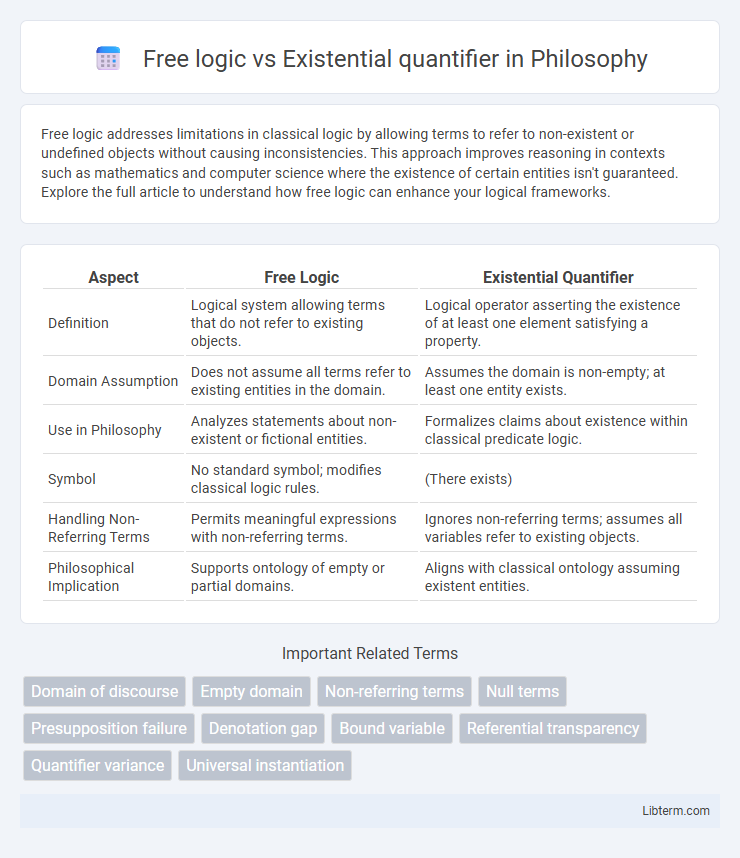Free logic addresses limitations in classical logic by allowing terms to refer to non-existent or undefined objects without causing inconsistencies. This approach improves reasoning in contexts such as mathematics and computer science where the existence of certain entities isn't guaranteed. Explore the full article to understand how free logic can enhance your logical frameworks.
Table of Comparison
| Aspect | Free Logic | Existential Quantifier |
|---|---|---|
| Definition | Logical system allowing terms that do not refer to existing objects. | Logical operator asserting the existence of at least one element satisfying a property. |
| Domain Assumption | Does not assume all terms refer to existing entities in the domain. | Assumes the domain is non-empty; at least one entity exists. |
| Use in Philosophy | Analyzes statements about non-existent or fictional entities. | Formalizes claims about existence within classical predicate logic. |
| Symbol | No standard symbol; modifies classical logic rules. | (There exists) |
| Handling Non-Referring Terms | Permits meaningful expressions with non-referring terms. | Ignores non-referring terms; assumes all variables refer to existing objects. |
| Philosophical Implication | Supports ontology of empty or partial domains. | Aligns with classical ontology assuming existent entities. |
Introduction to Free Logic and Existential Quantifiers
Free logic modifies classical logic by allowing terms that do not refer to existing objects, avoiding existential assumptions in predicates. Existential quantifiers in classical logic assert the existence of some element satisfying a property, but free logic refrains from such implications when terms are empty or non-referential. This distinction enhances precision in formal semantics and philosophical logic by accommodating non-denoting expressions without committing to their actual existence.
Historical Background of Quantification in Logic
Early developments in quantification logic trace back to Frege's Begriffsschrift (1879), introducing formal systems for existential and universal quantifiers. Free logic emerged in the 20th century to address limitations in classical logic when terms may refer to non-existent objects, refining existential quantifier interpretations. This evolution highlights the foundational shifts from classical predicate logic to more nuanced treatments of existence within logical systems.
Core Principles of Free Logic
Free logic modifies classical logic by allowing terms to refer to non-existent or undefined objects, addressing limitations of the existential quantifier that presupposes existence. It distinguishes between reference and existence, enabling meaningful statements about empty domains or fictional entities without implying their existence. Core principles of free logic include the relaxation of existential import and the introduction of existence predicates to explicitly track the existence status of objects.
The Role and Limitations of the Existential Quantifier
The existential quantifier () in classical logic asserts that at least one element in the domain satisfies a given property, limiting its scope to existing entities within that domain. Free logic extends this by allowing discussions about non-denoting or non-existent terms without presupposing their existence, addressing ontological assumptions inherent in . Limitations of the existential quantifier arise in contexts involving abstract, fictional, or non-existent objects, where free logic provides a more nuanced semantic framework.
Semantic Differences Between Free Logic and Classical Logic
Free logic diverges from classical logic by allowing terms without referents to be meaningful, addressing non-denoting expressions without presupposing existence. Unlike the classical existential quantifier, which asserts the existence of some object satisfying a property, free logic modifies the quantifier's interpretation to avoid existential import. This semantic adjustment enables free logic to handle empty domains and non-existent objects, preserving logical validity where classical logic fails.
Treatment of Non-Referring Terms
Free logic addresses the problem of non-referring terms by allowing terms to lack denotation without causing logical breakdown, contrasting with classical logic where existential quantifiers imply the existence of referents. It modifies the interpretation of existential quantifiers to avoid presupposing the existence of objects, thus accommodating statements involving empty terms or fictional entities. This approach ensures semantic coherence when analyzing sentences containing terms that do not correspond to any object in the domain of discourse.
Implications for Mathematical and Philosophical Logic
Free logic eliminates the presupposition of existential import inherent in classical logic's existential quantifier, enabling precise reasoning about non-existent or undefined entities. This distinction significantly impacts mathematical logic by allowing formal systems to handle empty domains and partial functions without contradiction. Philosophically, free logic challenges traditional assumptions about existence, refining ontological commitments and improving analyses of reference and meaning in language.
Key Figures and Texts in the Development of Free Logic
Key figures in the development of free logic include Karel Lambert and Richard Routley, who expanded traditional predicate logic to handle non-denoting terms without existential import. Foundational texts such as Lambert's "An Introduction to Free Logic" and Routley's papers in the 1970s established formal semantics that separate reference and existence. Their work contrasts with classical logic's existential quantifier, which presupposes the existence of objects referenced by terms, thus enabling more flexible reasoning in languages with empty or partial domains.
Applications and Use Cases of Free Logic
Free logic excels in handling statements about non-existent or hypothetical objects, making it invaluable in computer science for programming language semantics and artificial intelligence for reasoning under uncertainty. Its ability to avoid presupposing existence enables formal analysis of incomplete or inconsistent databases and supports natural language processing applications dealing with undefined or fictional entities. Unlike traditional existential quantifiers, free logic provides a robust framework for exploring metaphysical questions and ontology in philosophy without committing to the existence of every referenced entity.
Future Directions in Quantificational Logic
Future directions in quantificational logic emphasize refining the interplay between free logic and existential quantifiers to better handle non-existent and undefined terms in formal systems. Advances aim to enhance the semantic precision of quantifiers, particularly by integrating context-sensitive interpretations that accommodate partial domains and incomplete information. Research also explores extending free logic frameworks to support dynamic and computational applications, improving logical reasoning in artificial intelligence and formal verification.
Free logic Infographic

 libterm.com
libterm.com